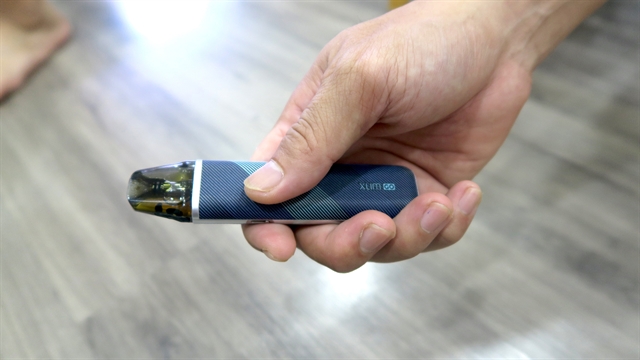 Society
Society

 |
| Smoking in public spaces is popular in Việt Nam. VNA/VNS Photo Phạm Kiên |
HÀ NỘI — The Vietnamese National Assembly (NA)'s decision to increase taxes on tobacco and sugary drinks has received enthusiastic support from the public, as it marks a crucial step in protecting public health and promoting the nation's sustainable development.
Last week, the NA officially passed the amended Special Consumption Tax Law, which includes a significant tax hike on tobacco and sugary beverages.
According to the new law, the special consumption tax on tobacco will be 75 per cent, with further increases planned in the next few years.
The absolute tax rate on tobacco from 2027 will follow a progressive increase schedule.
From January 1, 2027, it will increase to VNĐ2,000 per pack. From January 1, 2028, it will be VNĐ4,000 per pack, before rising gradually to VNĐ10,000 per pack on January 1, 2031.
The Ministry of Health views this decision as aligned with the recommendations of the World Health Organization (WHO) and believes it could significantly reduce the smoking rate among men, targeting a decrease to 36 per cent by 2030.
The aim of the new law does not end at those targets. It ultimately targets a reality in which millions of lives could be saved, thousands of families spared from illness and a generation of youth growing up without the shadow of tobacco smoke.
Dr Nguyễn Huy Quang, former director of the Legal Department for the Ministry of Health, said tobacco is the leading cause of non-communicable diseases in Việt Nam, including lung cancer, cardiovascular disease, stroke and chronic respiratory diseases.
He stressed that we cannot continue to let tens of thousands of people die each year while the most effective tool — tax — has been underutilized.
“Increasing tobacco taxes is not just a regulatory measure, but also a moral action," he told Đầu Tư (Investment) newspaper.
In reality, the price of tobacco in Việt Nam is alarmingly low. At under VNĐ10,000 per pack, tobacco is easily accessible even to students, workers and low-income people.
Director of HealthBridge Canada in Vietnam, Nguyễn Thị An, said when incomes rise but tobacco prices remain unchanged, we are unintentionally creating a perfect condition for a new wave of addiction.
Increasing taxes is the key solution to halt that explosion, she said.
Dr Phan Thị Hải, deputy director of the Tobacco Harm Prevention Fund under the Ministry of Health, said over 45 million Vietnamese are at risk of tobacco-related diseases, many of whom are in their working-age years, a group crucial to the economy. Without timely intervention, the consequences of tobacco use will continue to spread, deeply impacting economic growth and social security in the coming decades.
Tobacco consumption not only harms personal health but also causes severe economic, environmental and social consequences.
According to the Vietnam Health Economics Association, the annual healthcare costs and lost labour productivity due to tobacco-related diseases amount to VNĐ108 trillion, or 1.14 per cent of GDP. This figure is five times higher than the tobacco tax revenue for the national budget.
Tobacco waste such as cigarette butts, packaging and filter plastic causes significant environmental damage, with an estimated total cost of nearly VNĐ99 trillion per year, or 1.04 per cent of GDP.
This means that just tobacco consumption alone causes a loss of more than 2 per cent of Việt Nam's GDP each year.
 |
| E-cigarettes have been banned in Việt Nam since early this year. VNA/VNS Photo Đinh Hằng |
Senior Vice President of Policy, Advocacy and Communication at Vital Strategies Sandra Mullin said tobacco use in Việt Nam is severely harming public health and people's lives while hindering sustainable economic development. Implementing strong tobacco tax reforms now will pave the way for a healthier future, especially for the younger generation, and help promote economic prosperity in Việt Nam for years to come.
Sugary beverages
The NA also passed a regulation imposing special consumption taxes on sugary beverages.
Products with sugar content exceeding five grammes per 100ml will be taxed at 8 per cent starting in 2027, increasing to 10 per cent in 2028. However, natural fruit juices, coconut water, milk and liquid nutrition products will be exempt from the tax.
According to WHO, the consumption of sugary drinks is a leading cause of non-communicable diseases such as type 2 diabetes, cardiovascular diseases, strokes and cancer.
In Việt Nam, non-communicable diseases account for 80 per cent of all deaths and are increasingly affecting younger people of working age.
Over the past 15 years, sugary beverage consumption in Việt Nam has quadrupled. By 2023, the average person will consume nearly 70 litres per year, or 1.3 litres per week.
Imposing taxes on these products not only holds financial significance, but also serves as a clear warning to consumers about the potential risks of these seemingly 'harmless' products, said experts.
WHO Representative in Việt Nam Dr Angela Pratt said reforming taxes on tobacco, alcohol and sugary drinks is a necessary step not only to improve public health but also to foster sustainable economic growth. VNS
Health ministry proposes fine for e-cigarette usersHÀ NỘI — The Ministry of Health has proposed a fine of VNĐ3 million to VNĐ5 million for those who use e-cigarette, heated tobacco and new-generation tobacco products amid growing concerns over their impact on youth and public health.Those who knowingly allow others to use e-cigarettes on their premises without taking preventive action or reporting the violations to authorities could be fined from VNĐ5 million to VNĐ10 million.The proposal has been made after Việt Nam became the sixth country in ASEAN and 43rd country worldwide to ban e-cigarette and heated tobacco products.Starting this year, all of these products have been put on the list of banned items. The use of electronic cigarettes and heated tobacco products is rising rapidly in Việt Nam, particularly among children and adolescents, according to data from the Ministry of Health.From 2015 to 2020, the rate of e-cigarette use among adults aged 15 and older increased from 0.2 per cent to 3.6 per cent.The Ministry of Health has issued warnings about the serious risks these products pose to young people. In 2023 alone, 1,224 people were hospitalised due to poisoning or illnesses related to the use of e-cigarettes and heated tobacco.Authorities have reported several cases in which illegal drugs were disguised in e-cigarette products, leading to multiple instances of student poisonings requiring emergency treatment.According to the Ministry of Public Security, in 2023, eighty-six cases related to e-cigarettes and heated tobacco containing drugs were prosecuted, while the first quarter of 2024 alone saw 33 cases. VNS